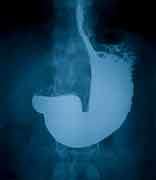Unhealthy dietary behaviors linked to functional dyspepsia

(HealthDay)—Unhealthy dietary behaviors are associated with refractory functional dyspepsia (RFD), according to a study published in the December issue of the Journal of Digestive Diseases.
Shu Man Jiang, from the Guangzhou Medical University in Meizhou, China, and colleagues examined the correlation between dietary behavior with RFD and its subtypes in Chinese patients. The authors examined medical records for 1,341 patients with functional dyspepsia, including 327 patients with RFD and 1,014 with non-RFD (NRFD). One hundred healthy volunteers were included as controls. Dietary behaviors were assessed using a questionnaire survey.
The researchers found that the prevalence of unhealthy dietary behaviors was higher among RFD and NRFD compared with healthy controls. RFD patients more often skipped meals, ate extra meals, and had a preference for sweet food and gas-producing food. Patients with RFD-epigastric pain syndrome (EPS) preferred spicy food, while patients with postprandial distress syndrome (PDS) preferred sweet food and gas-producing food, compared to those with NRFD. Those with both EPS and PDS more often skipped meals and ate extra meals. Skipping meals, eating extra meals, and a preference for sweet and gas-producing foods were identified as RFD risk factors.
"Unhealthy dietary behaviors, especially skipping meals, eating extra meals, and a preference to sweet food and gas-producing food, were correlated with RFD and its subtypes," the authors write.
More information:
Abstract
Full Text (subscription or payment may be required)
Copyright © 2015 HealthDay. All rights reserved.














